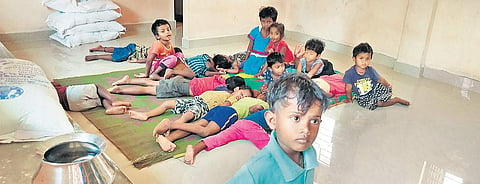

CHENNAI: When the city corporation took around 150 representatives from Aminjikarai in two buses to the Slum Clearance Board tenements at Navalur, Serapanancheri panchayat, around four months ago for a tour before their eviction, Malarvizhi, who was one of them, didn’t note the distance. She now regrets it.“Since we were taken there directly on a private bus, none of us kept track. But one of us should have noted the distance,” she says.
Navalur was one of the most sought after resettlement colonies for those evicted under the Cooum River Restoration Project mainly because there were only 2,048 houses, as opposed to the 24,000 at Perumbakkam, the only other option offered.
Today, the 1,700 families, mostly from Aminjikarai, who have resettled here find themselves in a strange land, almost cut off from the places where they lived and worked — over 50 km away. What’s more, they are scrambling for specific spots. For instance, the entrance of a balwadi at the premises, just to receive mobile connectivity.
But besides being one of the few places where mobile connectivity is available, the balwadis are of little use, claim residents. When Express visited, only one of the three balwadis had a teacher. The others had two caretakers, qualified only to cook, feed and care for the kids.
When Express visited the Slum Clearance Board tenements at Navalur, only one of the three balwadis had fans and an operational kitchen. “I cook from home and bring the children food everyday,” said the caretaker of a balwadi that did not have a functional kitchen.The primary school that functions in the premises, did not have a compound wall nor a playground, in violation of the Right to Education (RTE) Act and had children darting in and out of classrooms.
“I’ve only seen the children sleep most of the time in these balwadis. I don’t think they learn anything,” said Parvathi, a 60-year-old.Parvathi’s Bhavani Amman tiffin centre at Aminjikarai was a local favourite, said residents. Now, she struggles to find work since most opportunities that come by, facilitated by the TNSCB or otherwise, are for those between the 18-35 age bracket.
“If you ask our neighbours, they’ll tell you we used to feed those who are less fortunate than us. Now, we ourselves are struggling for a day’s meal,” said Parvathi, mother to a 35-year-old epileptic patient.
Under MGNREGA, some of the residents are enrolled to clean the dust bins within their premises, or sweep their own premises. “Given a choice, we wouldn’t do the work, but considering there are few livelihood options here, we decided to take it up,” said Chitra.
The ration shop in the premises opened for the first time on Thursday, said residents. But it provided supplies to only around 700 of the 1700 families living in the tenements. “They provide supplies only against the ration card numbers in the list stuck outside the shop. Even for those whose numbers are listed, only rice, in limited quantities, were made available,” said Valar (name changed), a resident.
The others have to go back to their old ration centres at Anna Nagar, a trip that they said, cost them `120 (to and fro)- two buses and a share auto each trip.“The single bus that plies here comes once every two hours or so,” said Priya, a resident who used to work as a domestic help.
Even with the issues in the townships, those resettled under the Cooum River Restoration project are seemingly in better positions when compared to others evicted from some areas like Guduvanchery and Urapakkam, who said, even after four months of moving in, they did not even have an allotment order. “We only have a token until now,” said a resident who had been shifted from Urapakkam.
When contacted, slum clearance board officials said the powers of the board were limited. For instance, power supply to the balwadi should come through the local panchayat. “There is no housing and habitat policy that binds the line departments involved to perform their duties according to schedule,” the official said. “We are doing everything in our power — even now we’ve been trying to get Big Basket and Swiggy on board to hire delivery executives from the settlements here,” the official added.
Vanessa Peter, a policy researcher from IRCDUC said that the gap in the jurisdiction issues and the roles and responsibilities between TNSCB and local bodies is an issue that is waiting to be addressed.
“The government is yet to learn from its previous mistakes. We have been demanding a comprehensive housing policy. Since there are diverse resettlement practices across the State, there is a need for a separate Rehabilitation and Resettlement (R&R) policy that can be uniformly applied to all resettlements. The current practices are either based on departments or projects,”she said.
In the minutes of the meeting held by the then Chief Secretary to government regarding the infrastructure facilities to be provided to resettlement sites like Okkiyam Thoraipakkam and Perumbakkam, as early as in 2010, similar issues were discussed.
The Secretary to Government, HUD department had stated that TNSCB had created infrastructure, but the local bodies were unable to maintain them. In response, Principal Secretary to Government RD&PR department said that the local bodies were unable to deliver the services because of two reasons — they did not have the necessary funds or staff since ‘this was decided based on the census 2001 and the State Finance Commission Funds could not be increased now. Secondly, it stated that they were unable to tax the residents to fund service delivery.Eight years down the line, little has been done to address these issues.
Little assistance
Families evicted from areas like Guduvanchery and Urapakkam claimed that they were deprived of benefits such as shifting and subsistence allowances, that are usually extended to families shifted under the Cooum river restoration project